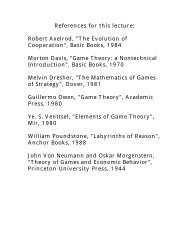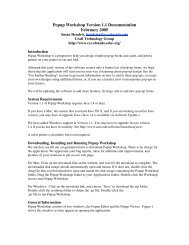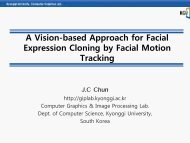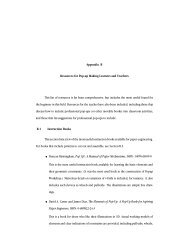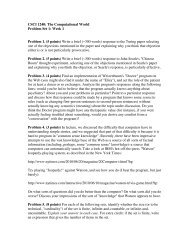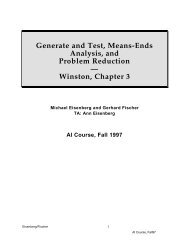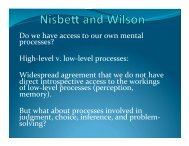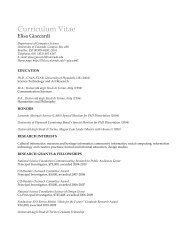� tools <strong>for</strong> learning: grounded in a “scaffolding with fading” perspective leading to autonomous per<strong>for</strong>mance by people without tools. This distinction raises fundamental questions about the future of education, learning, working, and the development and use of new media by asking what it means to learn in the 21st century. We now live in a world where powerful tools are available <strong>for</strong> many intellectual activities—allowing people to have instant access to facts, assisting people in spelling, doing arithmetic, and per<strong>for</strong>ming numerous other intellectual activities [Pea, 2004]. The Impact and the Future of CSCL@Work A major impact of CSCL at work will be (1) to conduct research on the monopoly and exclusiveness of <strong>for</strong>mal school learning [Collins & Halverson, 2009], and (2) to complement and enrich current practices in adult education (that often is reduced to training [Fischer, 2000]). Inspirations, concepts, and organization may come from analyzing, fostering, and supporting cultures of participation [Fischer, 2011]. CSCL at work provides the unique opportunity to explore and define conceptually alternative modes of computer-supported, collaborative learning that will enrich learning and working in the 21 st century. It has the potential to close the gap between school and workplace learning by allowing learners to engage in activities requiring collaboration, creativity, problem framing, and distributed cognition. It will provide insights and alternative models of cognitive activities by illustrating what can be learned as a result of intentional teaching and what can be learned from working on interesting problems with other humans utilizing powerful and innovative computational media. Acknowledgments I thank the members of the Center <strong>for</strong> LifeLong Learning & Design (L3D) at the University of Colorado, Boulder, who have made major contributions to the ideas and developments described in this paper. Hal Eden and Ernesto Arias deserve special thanks <strong>for</strong> their development of the EDC that has served as an important object-to-think-with <strong>for</strong> this article. I am grateful to Sean Goggins and Isa Jahnke (1) <strong>for</strong> providing me with the opportunity to present a keynote lecture in their workshop “CSCL@Work” at the GROUP 2010 conference that provided an important seed <strong>for</strong> this article, and (2) <strong>for</strong> constructive feedback to earlier version of this article. The research was supported in part by the following grants from the National Science Foundation: � IIS-0968588 “SoCS: Energy Sustainability and Smart Grids: Fostering and Supporting Cultures of Participation in the Energy Landscape of the Future”; � IIS-1111025 “SoCS: Theoretical <strong>Framework</strong>s and Socio-Technical Systems <strong>for</strong> Fostering Smart Communities in Smart Grid Environments”; and � OCI-1028017 “CDI-Type I: Trans<strong>for</strong>mative Models of Learning and Discovery in Cultures of Participation”. Gerhard Fischer 16 Contribution to Book “CSCL at Work”
References Arias, E. G., Eden, H., Fischer, G., Gorman, A., & Scharff, E. (2000) "Transcending the Individual Human Mind—Creating Shared Understanding through <strong>Collaborative</strong> Design," ACM Transactions on <strong>Computer</strong> Human-Interaction, 7(1), pp. 84-113. Benkler, Y. (2006) The Wealth of Networks: How Social Production Trans<strong>for</strong>ms Markets and Freedom, Yale University Press, New Haven. Bowker, G. C., & Star, S. L. (2000) Sorting Things out — Classification and Its Consequences, MIT Press, Cambridge, MA. Brown, J. S., & Duguid, P. (1991) "Organizational Learning and Communities-of-Practice: Toward a Unified View of Working, Learning, and Innovation," Organization Science, 2(1), pp. 40-57. Bruner, J. (1996) The Culture of Education, Harvard University Press, Cambridge, MA. Campbell, D. T. (2005) "Ethnocentrism of Disciplines and the Fish-Scale Model of Omniscience." In S. J. Derry, C. D. Schunn, & M. A. Gernsbacher (Eds.), Interdisciplinary Collaboration — an Emerging Cognitive Science, Lawrence Erlbaum, Mahwah, NJ, pp. 3-21. Carmien, S., Kollar, I., Fischer, G., & Fischer, F. (2007) "The Interplay of Internal and External Scripts." In F. Fischer, I. Kollar, H. Mandl, & J. M. Haake (Eds.), Scripting <strong>Computer</strong>-<strong>Supported</strong> Learning – Cognitive, Computational, and Educational Perspectives, Springer, New York, NY, pp. 303-326. Carroll, J. M., & Rosson, M. B. (1987) "Paradox of the Active User." In J. M. Carroll (Ed.), Interfacing Thought: Cognitive Aspects of Human-<strong>Computer</strong> Interaction, The MIT Press, Cambridge, MA, pp. 80-111. Collins, A., & Halverson, R. (2009) Rethinking Education in the Age of Technology: The Digital Revolution and the School, Teachers College Press New York, NY. Csikszentmihalyi, M. (1996) Creativity — Flow and the Psychology of Discovery and Invention, HarperCollins Publishers, New York, NY. dePaula, R., & Fischer, G. (2005) "Knowledge Management: Why Learning from the Past Is Not Enough!" In J. Davis, E. Subrahmanian, & A. Westerberg (Eds.), Knowledge Management: Organizational and Technological Dimensions, Physica Verlag, Heidelberg, pp. 21-54. Derry, S. J., & Fischer, G. (2007) Transdisciplinary Graduate Education available at http://l3d.cs.colorado.edu/~gerhard/papers/transdisciplinary-sharon.pdf. Derry, S. J., Schunn, C., & Gernsbacher, M. A. (Eds.) (2005) Interdisciplinary Collaboration: An Emerging Cognitive Science, Erlbaum, Mahwah, NJ. Drucker, P. F. (1994) "The Age of Social Trans<strong>for</strong>mation," The Atlantic Monthly(November), pp. 53-80. Eisenberg, M., & Fischer, G. (1994) "Programmable Design Environments: Integrating End- User Programming with Domain-Oriented Assistance." In Human Factors in Computing Systems, Chi'94 (Boston, Ma), ACM, New York, pp. 431-437. Engeström, Y. (2001) "Expansive Learning at Work: Toward an Activity Theoretical Reconceptualization," Journal of Education and Work, 14(1), pp. 133-156. Fischer, G. (1991) "Supporting Learning on Demand with Design Environments." In L. Birnbaum (Ed.), International Conference on the Learning Sciences (Evanston, Il), Association <strong>for</strong> the Advancement of Computing in Education, pp. 165-172. Fischer, G. (2000) "Lifelong Learning - More Than Training," Journal of Interactive Learning Research, Special Issue on Intelligent Systems/Tools In Training and Life-Long Learning (eds.: Riichiro Mizoguchi and Piet A.M. Kommers), 11(3/4), pp. 265-294. Fischer, G. (2005) "Distances and Diversity: Sources <strong>for</strong> Social Creativity." In Proceedings of Creativity & Cognition, ACM, London, April, pp. 128-136. Fischer, G. (2007) "Designing Socio-Technical Environments in Support of Meta-Design and Social Creativity." In Proceedings of the Conference on <strong>Computer</strong> <strong>Supported</strong> <strong>Collaborative</strong> Learning (CSCL '2007), Rutgers University, July, pp. 1-10. Fischer, G. (2010) Challenges and <strong>Conceptual</strong> <strong>Framework</strong>s <strong>for</strong> <strong>Computer</strong>-<strong>Supported</strong> Learning (CSCL) at Work. Presented at ACM Conference Group 2010, Workshop "CSCL at Work". available at http://www.csclatwork.org/node/9 Fischer, G. (2011) "Understanding, Fostering, and Supporting Cultures of Participation," ACM Interactions XVIII.3 (May + June 2011), pp. 42-53. Fischer, G. (2012) "Context-Aware Systems: The ‘Right’ In<strong>for</strong>mation, at the ‘Right’ Time, in the ‘Right’ Place, in the ‘Right’ Way, to the ‘Right’ Person." In G. Tortora, S. Levialdi, Gerhard Fischer 17 Contribution to Book “CSCL at Work”




